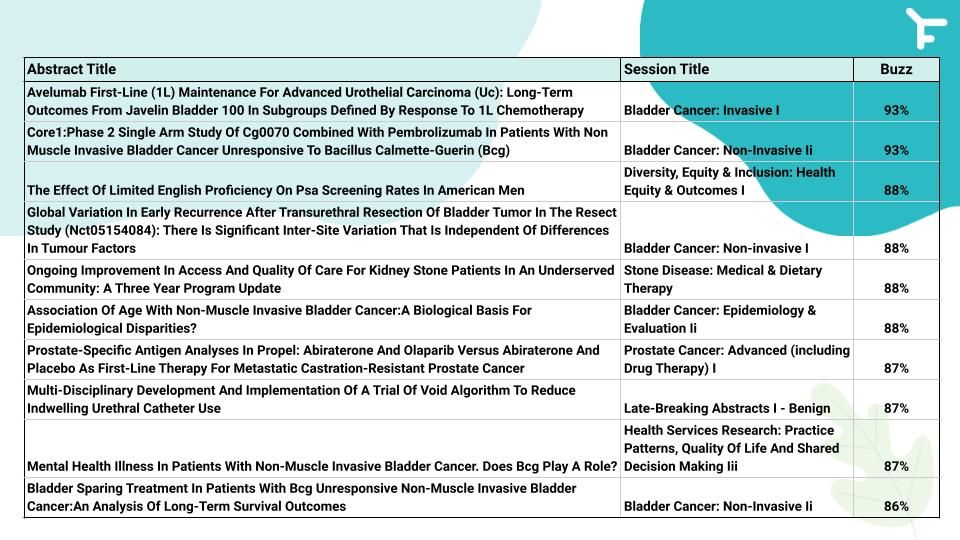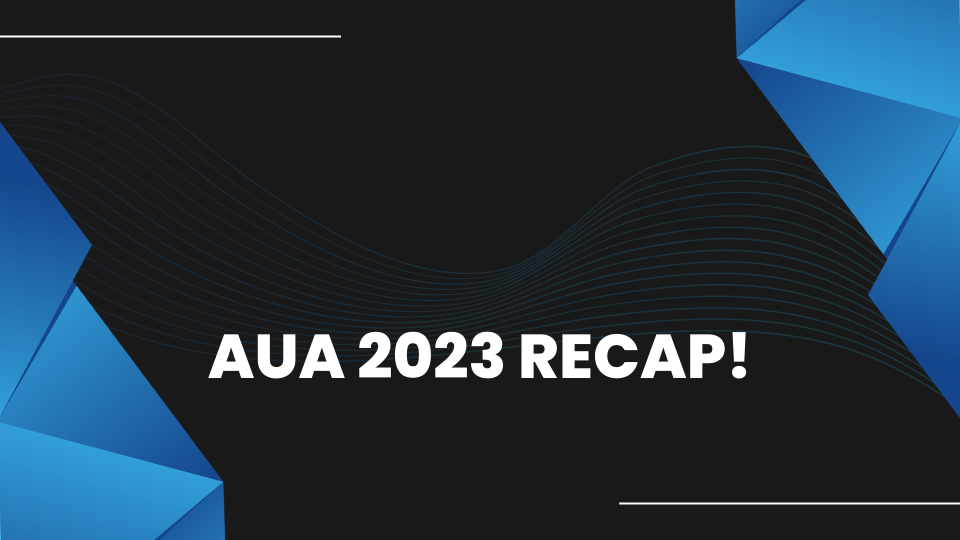The 2023 American Urological Association (AUA) Annual Meeting has come to a close. With over 23,000 members worldwide, the AUA is a leading organization dedicated to advancing the field of urology. The annual conference, which was held via a hybrid in-person/virtual model in Chicago, IL, from April 27 to May 1, 2023 provided attendees with a wealth of knowledge, insights, and opportunities to network with other professionals in the field.
Ferma.AI has analyzed all 3,466 abstracts presented at the conference, along with social media activity and news reports to determine the most relevant and high-impact sessions for urologists. The sessions that garnered the most attention covered a diverse range of content including cutting-edge research, new treatments and therapies and insights into the latest clinical practices.
Interested in learning more about how Ferma.AI can enhance your conference coverage and insights while also reducing costs by 40%? Schedule a brief call with us to see a live demonstration.
Most Impactful Sessions

Let’s dive into the key takeaways for these high-impact sessions:
Avelumab First-Line (1L) Maintenance For Advanced Urothelial Carcinoma (Uc): Long-Term Outcomes From Javelin Bladder 100 In Subgroups Defined By Response To 1L Chemotherapy
Session Title: Bladder Cancer: Invasive I
Session Type: Podium Session
[Abstract]
The JAVELIN Bladder 100 trial evaluated avelumab 1L maintenance plus best supportive care (BSC) versus BSC alone in patients with unresectable locally advanced or metastatic urothelial carcinoma (UC) who had not progressed after first-line platinum-based chemotherapy. In CR, median overall survival (OS) was 39.8 months for avelumab+BSC and 26.8 months for BSC alone with a hazard ratio of 0.72. Median progression-free survival (PFS) was 9.5 months for avelumab+BSC and 5.1 months for BSC alone with a hazard ratio of 0.58. The trial showed prolonged OS and PFS with avelumab+BSC versus BSC alone across all subgroups defined by response to first-line chemotherapy. Long-term safety was consistent across subgroups.
Core1:Phase 2 Single Arm Study Of Cg0070 Combined With Pembrolizumab In Patients With Non Muscle Invasive Bladder Cancer Unresponsive To Bacillus Calmette-Guerin (Bcg)
Session Title: Bladder Cancer: Non-Invasive Ii
Session Type: Podium Session
[Abstract]
This phase 2 study evaluates the potential synergy of intravesical CG0070 and pembrolizumab in treating BCG-unresponsive NMIBC. Enrollment has been completed, and a CR rate of 92% at 3 months has been observed. All patients in CR at 3 months remained in CR at downstream timepoints. The study's primary endpoint is CR at 12 months. Treatment-related adverse events are consistent with those observed in studies of each agent alone.
The Effect Of Limited English Proficiency On Psa Screening Rates In American Men
Session Title: Diversity, Equity & Inclusion: Health Equity & Outcomes I
Session Type: Moderated Poster Session
[Abstract]
The impact of limited English proficiency on rates of PSA screening and disparities in prostate cancer outcomes among racial and ethnic groups is unknown. This study analyzed the Medical Expenditure Panel Survey to identify rates of PSA screening among men without prostate cancer ≥55, stratifying them by self-reported levels of English proficiency. The study found that limited English proficiency was associated with significantly lower rates of PSA screening, with 58.4% of men who do not speak English at all reporting receiving at least one lifetime PSA test compared to 79.6% of men who speak English very well.
Global Variation In Early Recurrence After Transurethral Resection Of Bladder Tumor In The Resect Study (Nct05154084): There Is Significant Inter-Site Variation That Is Independent Of Differences In Tumour Factors
Session Title: Bladder Cancer: Non-invasive I
Session Type: Moderated Poster Session
[Abstract]
The RESECT study aimed to determine whether there is significant variation in early recurrence after transurethral resection of bladder tumor (TURBT) surgery between sites. After exclusions, 186 sites, contributing a total 4597 cases were included. Median recurrence rate per site was 12% for low grade and 27% for high grade tumours. There was significant residual variation attributable to site (p<0.0001), indicating a need for further investigation to understand the influence of surgical technique or perioperative practice.
Ongoing Improvement In Access And Quality Of Care For Kidney Stone Patients In An Underserved Community: A Three Year Program Update
Session Title: Stone Disease: Medical & Dietary Therapy
Session Type: Moderated Poster Session
[Abstract]
A comprehensive kidney stone program was established at a single institution to improve healthcare access, quality and outcomes for Medicaid-designated patients. The program involved urology, nephrology, and dietary specialists and was piloted over three years. 183 patients were evaluated, with 47% and 42% of patients receiving specialty referrals to nephrology or a dietician, respectively. Reported patient compliance and referrals to multidisciplinary specialists increased from 72.9% to 81.3% and 21.2% to 56.2%, respectively, while no-show rates at first follow-up decreased from 20.0% to 6.3%.
Association Of Age With Non-Muscle Invasive Bladder Cancer:A Biological Basis For Epidemiological Disparities?
Session Title: Bladder Cancer: Epidemiology & Evaluation Ii
Session Type: Podium Session
[Abstract]
The study investigated age disparities in patients with non-muscle-invasive bladder cancer using data from two cohorts. Analysis of the SEER-Medicare cohort (n=32,225) showed that patients aged ≥81 yrs with hazard ratio 1.32 had higher rates of progression and bladder-cancer specific mortality compared to younger patients. UROMOL dataset analysis (n=834) revealed age-related molecular biological differences across transcriptomic and genomic domains. Patients >75 yrs had higher rates of TP53 pathway change and genomic class 3 compared to younger patients. No significant differences were observed in immune cell infiltration scores between age groups.
Prostate-Specific Antigen Analyses In Propel: Abiraterone And Olaparib Versus Abiraterone And Placebo As First-Line Therapy For Metastatic Castration-Resistant Prostate Cancer
Session Title: Prostate Cancer: Advanced (including Drug Therapy) I
Session Type: Moderated Poster Session
[Abstract]
The PROpel study investigated the efficacy of abiraterone (abi) and olaparib (ola) versus abi and placebo (pbo) in the first-line treatment of metastatic castration-resistant prostate cancer (mCRPC). Confirmed PSA response rate was 79.3% with abi and ola vs 69.2% with abi and pbo in the overall population, and ≥7% higher with abi and ola vs abi and pbo in each subgroup. Post-hoc exploratory analyses revealed that abi and ola resulted in higher PSA response rates and prolonged time to PSA progression in all patients, with greater improvements observed in those with HRRm and/or BRCA mutations. Time to PSA progression was also prolonged with abi and ola in all patient subgroups.
Multi-Disciplinary Development And Implementation Of A Trial Of Void Algorithm To Reduce Indwelling Urethral Catheter Use
Session Title: Late-Breaking Abstracts I - Benign
Session Type: Moderated Poster Session
[Abstract]
To reduce catheter-associated urinary tract infections (CAUTIs) in post-operative patients, a standardized algorithm for removing indwelling Foley catheters was developed and implemented in a surgical Step-Down Unit. The primary outcome was mean cumulative catheter days, which decreased significantly from 14.8 to 9.9 days after algorithm implementation (p<0.01). The mean daily number of patients with catheters also decreased (3.7 vs. 3.1, p=0.02), with no change in patient volume. There was one CAUTI potentially associated with algorithm non-adherence.
Mental Health Illness In Patients With Non-Muscle Invasive Bladder Cancer. Does Bcg Play A Role?
Session Title: Health Services Research: Practice Patterns, Quality Of Life And Shared Decision Making Iii
Session Type: Moderated Poster Session
[Abstract]
The study aimed to evaluate the incidence of mental health illness (MHI) in non-muscle invasive bladder cancer patients and the impact of intravesical BCG on the development of non-neurodegenerative MHI. Of 30,991 identified patients, 27% received BCG, and 43.7% developed MHI after diagnosis, with higher rates in elderly and female patients. Patients receiving at least an induction course of BCG had a lower rate of MHI development than those who did not receive BCG. Those with pre-existing MHI were less likely to receive BCG.
Bladder Sparing Treatment In Patients With Bcg Unresponsive Non-Muscle Invasive Bladder Cancer:An Analysis Of Long-Term Survival Outcomes
Session Title: Bladder Cancer: Non-Invasive Ii
Session Type: Podium Session
[Abstract]
This study aimed to compare long-term survival outcomes of bladder sparing treatment (BST) versus early radical cystectomy (RC) in patients with Bacillus Calmette-Guerin (BCG) unresponsive non-muscle invasive bladder cancer. Of 118 patients, 80 underwent BST and 38 underwent early RC. Outcomes for overall survival and cancer-specific survival (CSS) between the two groups were inconclusive. At 60 months, BST treated patients had high-grade recurrence-free survival rates of 37%, progression-free survival rates of 84%, and avoidance of RC rates of 81%. Delayed RC had similar outcomes to early RC.
Wrap-up
Ferma.AI tracks abstract and data releases for all major healthcare conferences, alongside social media and healthcare news reactions. Interested in learning more about how Ferma.AI can enhance your conference coverage and insights while also reducing costs by 40%?
Schedule a brief call with us to see a live demonstration.


